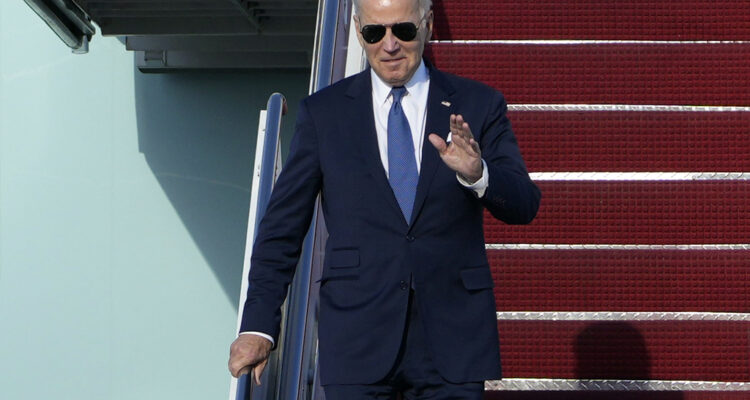The president and senior administration officials were resolute that the same weapons now being sent to Kyiv constituted a war crime.
By JNS
Parsing U.S. President Joe Biden’s view on the sorts of munitions that break up into individual canisters when dropped from an aircraft could induce a cluster headache.
On Feb. 28, 2022, then White House Press Secretary Jen Psaki said that if Russia had used cluster bombs, “it would potentially be a war crime.”
A few days later, Linda Greenfield-Thomas, U.S. ambassador to the United Nations, told the General Assembly that cluster munitions are “exceptionally lethal weaponry” which “has no place on the battlefield.”
In June 1982, Joe Biden, then a U.S. senator from Delaware, said that if Israel used cluster bombs against Palestine Liberation Organization terror targets in Lebanon, “they clearly are in violation and we should respond” by “cutting off the ability to get access to that kind of weaponry in the future,” the wire United Press International reported.
Then, last Friday, the Biden administration decided to send cluster bombs to Kyiv, leading the Washington Post to report on “Biden’s complicated history on cluster munitions.” Writing in Breitbart, Joel B. Pollak called it “flip-flopping.”
“The major issue with them is that the weapons can leave unexploded submunitions on the ground long after a conflict, endangering friendly troops and civilians,” the Post reported. “The Washington Post reports that Biden will bypass a U.S. law prohibiting cluster munitions with a failure rate of more than 1%.”
During a July 7 press briefing at the White House, Jake Sullivan, national security advisor, commented on Washington providing cluster bombs to Kyiv.
“We base our security assistance decision on Ukraine’s needs on the ground, and Ukraine needs artillery to sustain its offensive and defensive operations,” he stated. “We have provided Ukraine with a historic amount of unitary artillery rounds, and we are ramping up domestic production of these rounds. We’ve already seen substantial increases in production, but this process will continue to take time, and it will be critical to provide Ukraine with a bridge of supplies while our domestic production is ramped up. We will not leave Ukraine defenseless at any point in this conflict, period.”
He added that since the start of the war, Russia has used cluster munitions “with high dud or failure rates of between 30% and 40%.” The ones Washington would provide would have failure or dud rates “not higher than 2.5%,” he said.
“So the bottom line is this: We recognize that cluster munitions create a risk of civilian harm from unexploded ordnance. This is why we’ve deferred the decision for as long as we could,” Sullivan said. “But there is also a massive risk of civilian harm if Russian troops and tanks roll over Ukrainian positions and take more Ukrainian territory and subjugate more Ukrainian civilians because Ukraine does not have enough artillery. That is intolerable to us.”
He added that Kyiv would use the weapons to defend the country and its citizenry. “They are motivated to use any weapons system they have in a way that minimizes risks to those citizens,” he said.
In response to a question from a reporter, Sullivan said, “Ukraine has provided written assurances that it is going to use these in a very careful way that is aimed at minimizing any risk to civilians.”
“This is not Ukraine taking these and going and using them in the Middle East or in Southeast Asia or in some faraway land,” he added. “They’re using them on their territory to defend their territory.”
Reporters did not ask about Biden’s or U.S. responses to Israeli use of cluster bombs.
In June 1982, the New York Times reported that there was a “highly emotional confrontation” on Capitol Hill between then Israeli Prime Minister Menachem Begin and members of Congress, with Biden and Begin having the “bitterest exchange.” That appeared to be about a different issue than cluster munitions, however. (Begin referred to Biden only as a “young senator.”)
Even in March 2022, there was some question about what Greenfield-Thomas, the ambassador, meant to say, the Post reported.
The State Department crossed the phrase “which has no place on the battlefield” out on the transcript, adding “which are banned under the Geneva Convention.” An endnote added further, “the use of which directed against civilians is banned under the Geneva Conventions.”
On July 8, Robert F. Kennedy Jr.—who is running for president—questioned Biden’s stance on cluster bombs on Twitter.
“Last year, White House Press Secretary Jen Psaki called the use of cluster bombs a ‘war crime.’ Now President Biden plans to send them to Ukraine. Stop the ceaseless escalation! It is time for peace,” he wrote. “Biden was opposed to cluster bombs in 1982 as well, when he opposed their sale to Israel. What happened to his conscience?”
More than 950,000 Twitter users saw the tweet, about 28,500 liked it and more than 6,000 shared it, per Twitter statistics.





